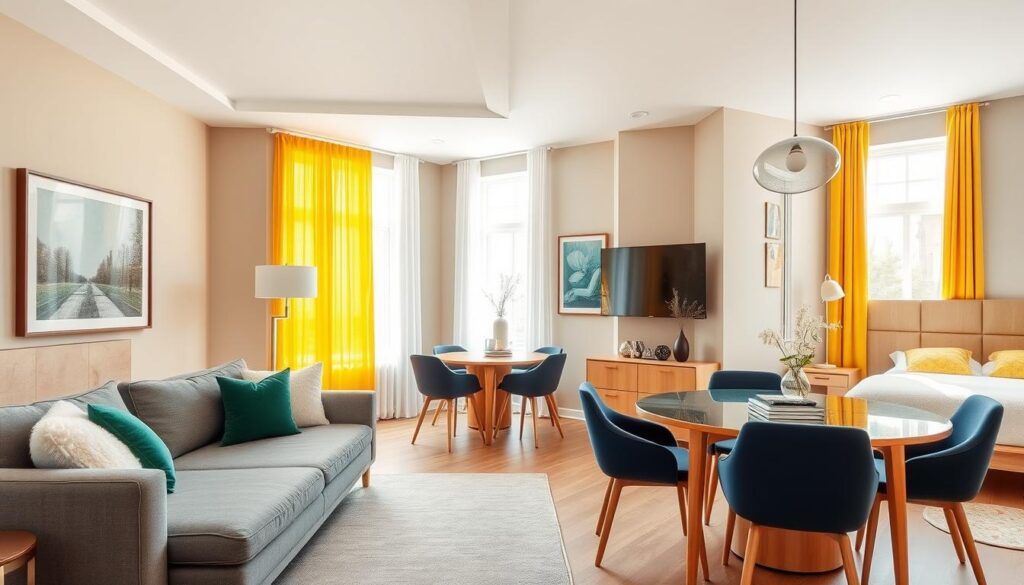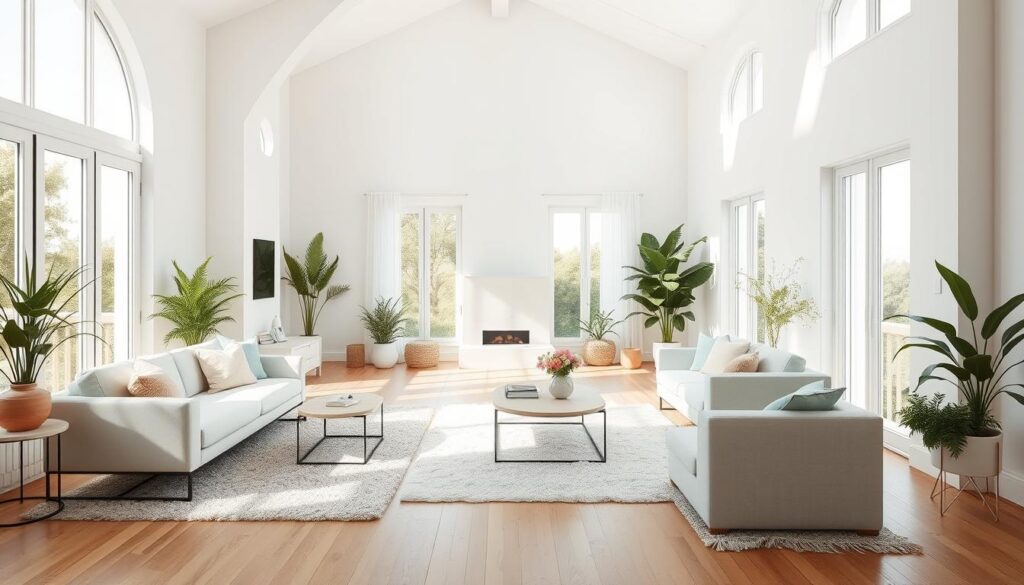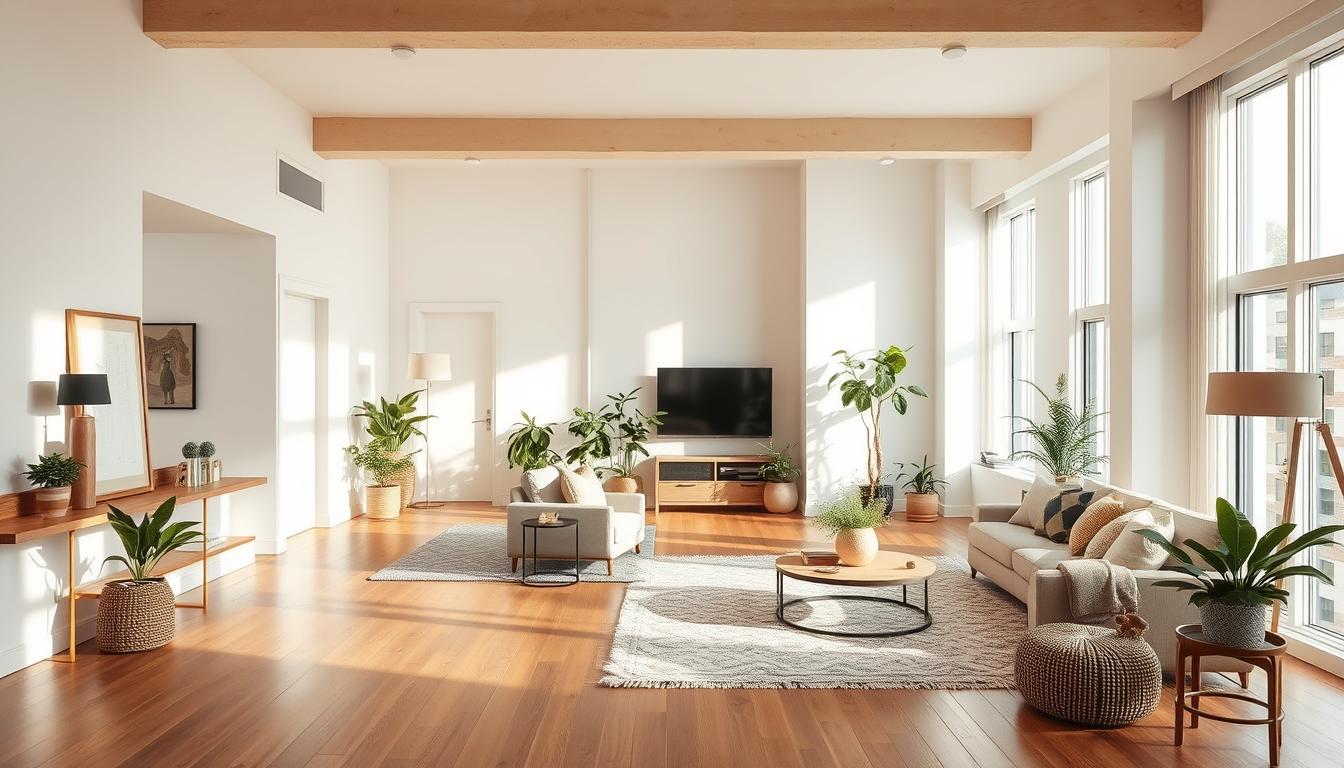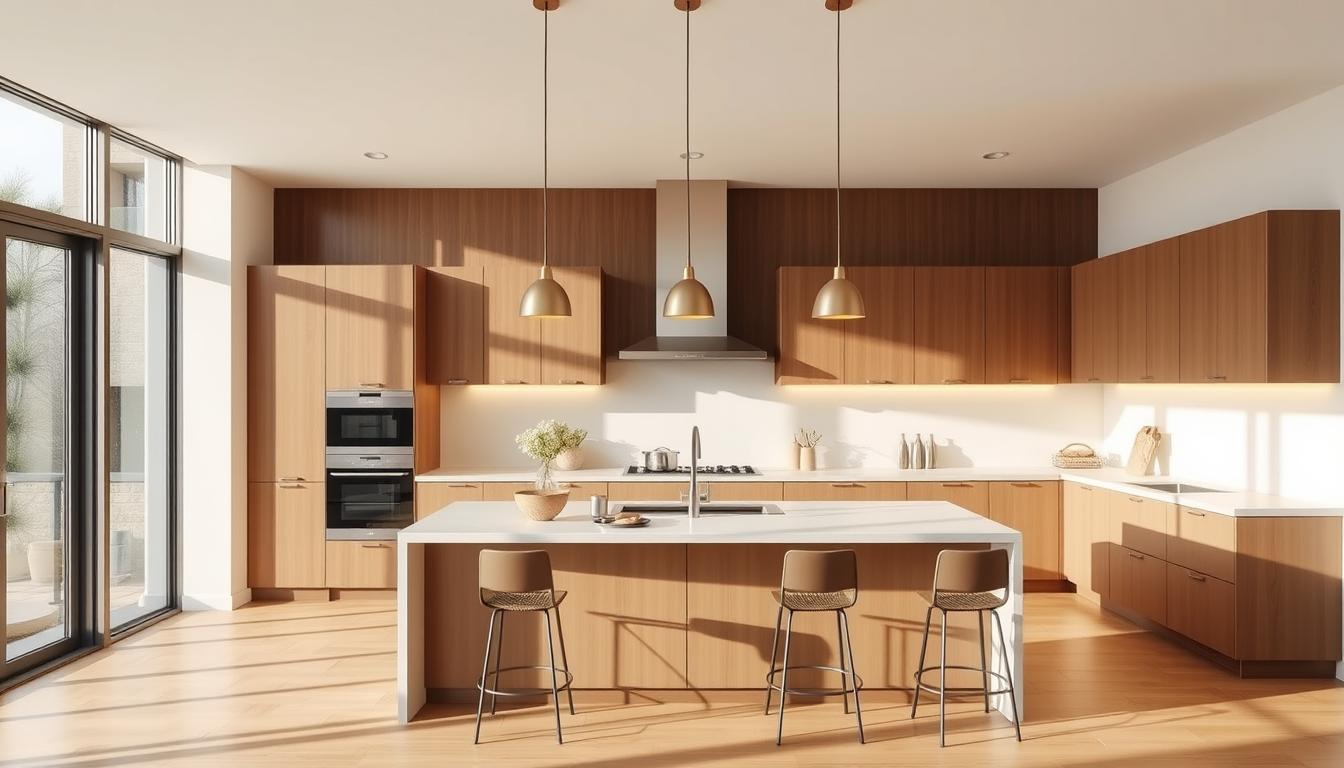Did you know that the colors you pick for your interior design can change how your room feels? Picking the right color palette is key when you’re redoing a room.
Choosing the right colors can seem hard, but it’s worth it. The right colors can make your home look better. They can make a room feel bigger, cozier, or more lively, depending on what you like.
Key Takeaways
- Colors play a crucial role in setting the ambiance and style of a room.
- A well-chosen color palette can enhance the aesthetic appeal of your living space.
- Different colors can make a room feel more spacious, cozy, or vibrant.
- Choosing the right colors is a crucial step in redecorating a room.
- A contemporary interior design color palette can greatly impact the overall look and feel of your home.
Understanding Modern Home Interior Colors
Learning about modern interior colors can make your home feel welcoming and balanced. These colors are shaped by trends, personal style, and your home’s look.
What Defines Modern Colors?
Modern colors are simple, elegant, and flexible. Trendy home color schemes mix calm neutrals with bold touches. This balance brings both peace and excitement to your space.
Neutrals like white, gray, and beige set a clean base. Then, bold colors add your unique touch.
Current trends also include natural colors, like earthy tones and sea-inspired blues. These colors mirror nature’s beauty and bring calm to your home.
The Psychology of Color Choices
Color psychology is key in interior design. Different hues can stir up different feelings. For example, cool colors like blue and green calm the mind, great for bedrooms and bathrooms.
Warm colors, like orange and red, energize and encourage talking. They’re perfect for living rooms and dining areas. Knowing how colors affect us helps pick the right colors for your home.
By understanding modern color traits and their emotional impact, you can design a home that looks good and feels right.
Popular Color Trends for Modern Interiors
In modern interior design, color is key. It sets the mood and feel of a home. The right colors can make any space look better.
Neutrals: The Timeless Choice
Neutral colors are a must in modern design. They offer a clean, sophisticated look. Shades like white, beige, and gray are top picks for a calm feel.
These colors work well on walls, furniture, and decor. They help create a space that looks stylish and modern, lasting for years.
Bold Accents: A Splash of Personality
Bold colors add personality to a room. Colors like emerald green, navy blue, and mustard yellow make a statement. They can brighten up a space on a wall, furniture, or accessories.
It’s important to balance bold colors with neutrals. This way, a room stays modern and reflects your style.
Nature-Inspired Palettes
Nature-inspired colors are becoming popular. Earthy tones like terracotta, sage green, and sandy beige bring warmth and coziness. They make a space feel calming and connected to nature.
Using natural colors and elements makes a space inviting and modern. Whether through paint, furniture, or decor, these palettes are stylish and versatile.
The Role of Lighting in Color Selection
Lighting plays a big role in choosing colors for your home. It can change how modern home interior colors look. Knowing this is key to a good interior design.
When picking a contemporary interior design color palette, think about both natural and artificial light. For more tips on picking the right colors, check out our guide on choosing the best home interior color.
Natural vs. Artificial Lighting
Natural light changes throughout the day, affecting color in your home. Artificial light, on the other hand, stays the same but can also change color appearance. For example, LED bulbs can make colors look different than incandescent bulbs.
Natural lighting is best for seeing colors as they really are. But it’s not always available, like at night or in dark rooms. Artificial lighting, though, can be adjusted to change the color scheme as you like.
How Light Affects Color Perception
The way we see modern home interior colors changes with different lighting. A color might look great in bright light but dull in dim light. A bold color can be too much in bright light but cozy in soft light.
To choose colors wisely, test them under various lights. Paint sample swatches on walls and see how they look at different times or under different lights.
Understanding how lighting affects color choice helps create a welcoming home. It shows off your personal style and preferences.
Choosing the Right Base Color for Walls
The color of your walls sets the mood for your room. It’s key to pick a color that fits your home’s look and the best modern interior paint colors trending now.
The Impact of Wall Color on Space
The wall color greatly changes how a room feels. Light colors make rooms look bigger and airier. Dark colors make them cozy and intimate. Think about how light changes the color of your walls during the day.
Best Practices for Choosing a Base Color
Start by thinking about what your room needs and the color scheme you want. A neutral color is a good choice. It lets your furniture and decor stand out. Then, add trendy home color schemes with accessories.
Some important tips are:
- Test samples on your walls before deciding
- Think about the room’s natural and artificial light
- Consider how the color will look with your furniture and decor
By picking the right base color and considering these points, you can make a welcoming space that shows off your style.
Accent Colors: Creating Visual Interest
Accent colors can make your home’s interior design pop. They add depth, personality, and style to any room. It’s like adding a secret ingredient to your space.
Picking Complementary Shades
Choosing the right accent colors is key. Look for shades that match your existing colors. The color wheel can help find complementary colors that stand out.
For example, a cool blue wall looks great with warm orange or yellow accents. This contrast brings energy and highlights design elements.
Balance and Contrast in Accessories
Accessories are a great way to add accent colors. Think throw pillows, blankets, vases, and more. There are endless options.
It’s important to balance your colors. The 60-30-10 Rule is helpful: 60% for the main color, 30% for the secondary, and 10% for the accent. This keeps your space harmonious while letting accent colors pop.
| Element | Color Percentage | Example |
|---|---|---|
| Dominant Color | 60% | Walls, main furniture |
| Secondary Color | 30% | Secondary furniture, rugs |
| Accent Color | 10% | Throw pillows, decorative vases |
Using the 60-30-10 Rule and picking complementary shades can make your space stylish and personal.
Color Combinations for Different Rooms
Different rooms in your home have different uses. The colors you pick should match that. The right colors can make each room better and your home feel more connected.
Warm and Inviting Living Rooms
The living room is where families and friends meet. For a cozy feel, try earthy tones like terracotta, sienna, or golden brown. Pair these with neutral shades like beige or cream for a balanced look.
- Terracotta and cream
- Sienna and soft gray
- Golden brown and taupe
To add a modern touch, bold colors like deep blues or emerald greens can bring excitement and depth.
Fresh and Functional Kitchens
Kitchens should feel bright and clean. Whites, creams, and light grays are great for walls and cabinets. A bold accent color through accessories or a backsplash can add personality.
- White and crisp blue
- Soft gray and warm wood tones
- Creme and rich green

Calm and Relaxing Bedrooms
Bedrooms should be peaceful places for rest. Soft blues, pale lavenders, or muted greens can help create a calm mood. Use neutral tones like white or beige to enhance the serenity.
- Soft blue and white
- Pale lavender and gray
- Muted green and natural wood tones
To make it cozier, add warm textiles and plush furniture in matching shades.
The Importance of Finishes in Color Application
In modern interior design, the finish of walls, furniture, and accessories is key. It affects how a color looks and how well it lasts. The right finish can make a room look great and be easy to keep clean.
Choosing a color means thinking about the finish too. Different finishes can change how a color looks. They can make it brighter or more subtle, depending on what you want.
Matte vs. Glossy: Effects on Appearance
Matte and glossy finishes change how we see color. Matte absorbs light, softening colors. This is good for calm spaces like bedrooms.
Glossy finishes reflect light, making colors pop. This is great for lively areas like kitchens. It makes the space feel more energetic and makes cleaning easier.
Textures that Enhance Color
Textures add depth and interest to a room. They make a space feel richer and more welcoming.
For example, mixing smooth walls with glossy tiles or textured fabrics creates a nice contrast. This mix not only looks good but also feels interesting, making the room more engaging.
| Finish Type | Effect on Color | Best Used In |
|---|---|---|
| Matte | Softens color appearance | Bedrooms, Living Areas |
| Glossy | Intensifies color appearance | Kitchens, Bathrooms |
| Textured | Adds depth and visual interest | Accent Walls, Furniture |
Knowing how finishes affect color helps us design better. Whether we choose matte, glossy, or textured, the right finish can make our home look and feel amazing.
Personal Style and Color Choices
Choosing the right colors for your home is more than following trends. It’s about showing who you are. Your home’s colors are a way to express your style and make a space that’s truly yours.
Reflecting Your Personality Through Color
Think about what colors make you feel good. If you’re bold and adventurous, choose vibrant colors. If you like calm, go for softer tones.
Consider your favorite colors and how they make you feel. Also, think about your furniture, artwork, and decor. They can help you pick colors. For example, modern furniture might look good with a monochromatic scheme and a bold color.
Customizing a Modern Color Palette
To create a modern color palette, start with a neutral base. This gives you a clean look for your decor. Then, add colors that show your personality. For example, if you love nature, use earthy tones like sage green or beige.
Here’s a simple guide to get you started:
| Style | Base Color | Accent Color |
|---|---|---|
| Modern Minimalist | White or Gray | Bold Primary Colors |
| Nature-Inspired | Beige or Sage | Earth Tones |
| Bold and Vibrant | Bright White | Vibrant Secondary Colors |
By following these tips and thinking about your style, you can make a trendy home color scheme that looks great and feels like home. Whether you like stylish house paint colors that are bold or soft, choose colors that make you happy and show your unique personality.
Seasonal Color Trends to Consider
Refreshing our homes with the seasons is exciting. Using seasonal colors keeps our spaces modern and welcoming. This way, we can update our decor often, staying in style.
Adding seasonal colors through accents and decor is easy. It lets us refresh our homes without big changes. Choosing colors that match the season creates a cozy and inviting space.
Spring/Summer: Light and Bright Tones
In spring and summer, lighter colors brighten our homes. Soft pastels, whites, and creams make spaces airy and welcoming. Here are some favorites:
- Soft Pastels: Pale pink, baby blue, and mint green add elegance and freshness.
- Corals and Salmons: These warm colors bring warmth and energy to our homes.
- Seafoam Greens: Inspired by the ocean, these colors create a calm and serene feel.

Fall/Winter: Warm and Cozy Hues
In fall and winter, we prefer warmer colors for a cozy feel. Deep reds, oranges, and yellows make our homes snug and inviting. Here are some key colors:
- Deep Reds and Burgundies: These bold colors add warmth and sophistication.
- Warm Neutrals: Caramel, honey, and taupe bring comfort and coziness.
- Earth Tones: Nature-inspired colors like sienna and umber create a grounded feel.
Using seasonal colors in our decor keeps our homes fresh and stylish all year. Whether we choose light and bright or warm and cozy, it’s all about having fun and finding what we love.
The Impact of Color on Home Value
Choosing the right colors for your home is key when selling. The colors we pick can make or break a home’s appeal to buyers. This, in turn, affects its market value.
How Colors Influence Buyer Perception
Colors play a big role in how buyers see a home. Best modern interior paint colors can make a home feel welcoming. This makes it more appealing to potential buyers.
Neutral colors like whites, grays, and beiges are timeless and versatile. They attract a wide range of buyers. Bold colors, on the other hand, can be a hit or miss. They might turn some buyers off but attract those who love unique decor.
Color Schemes That Add Value
Choosing the right modern home decor color schemes can boost a home’s value. Certain color combinations can make a home more appealing and even increase its selling price. For example, a mix of soothing colors for bedrooms and lively tones for living areas can make a home inviting.
Some top color schemes include:
- Neutral backgrounds with pops of color through furniture and decor
- Monochromatic schemes that create a sense of continuity and flow
- Nature-inspired palettes that bring the outdoors in, enhancing the sense of space and tranquility
By picking the right colors and schemes, homeowners can improve their living spaces. They can also increase their home’s value and appeal to potential buyers.
DIY Tips for Choosing Interior Colors
Choosing the right interior colors can be easy with a few DIY tips. You can make your home look stunning and trendy. The secret is to try out different colors and see how they fit in your space.
Sample Testing: The Secret to Success
Sample testing is a key DIY tip for picking interior colors. It’s important to see how colors look in your home’s lighting. Paint small swatches on the walls and watch how the color changes during the day.
- Start with a small area to test the color.
- Observe the color at different times of day.
- Consider how the color looks with your furniture and decor.
Tools and Apps for Visualizing Colors
Today, there are many tools and apps to help you see different colors. For example, apps like Coolors and Pantone let you try colors on your room’s photo.
Some popular tools include:
- Coolors app for color palette generation.
- Pantone app for precise color matching.
- Online color picker tools for experimenting with different shades.
By using sample testing and modern tools, you can pick a color scheme that’s both trendy and personal. The goal is to make your home welcoming and harmonious.
Seeking Professional Help for Color Selection
Choosing the right colors for your home can be tricky. A professional can help make your space look amazing. They know how to pick colors that work well together.
Expert Guidance for Personalized Color Schemes
Talking to an interior designer can give you advice that fits your style. They can pick colors that show who you are and match your home’s look.
Benefits of Professional Color Consultation
Color experts bring new ideas and trends to the table. They’re great for big or complex spaces. They make sure your colors look good and work well.
Getting help from experts can make your home look better. It adds value and makes your space more inviting.



